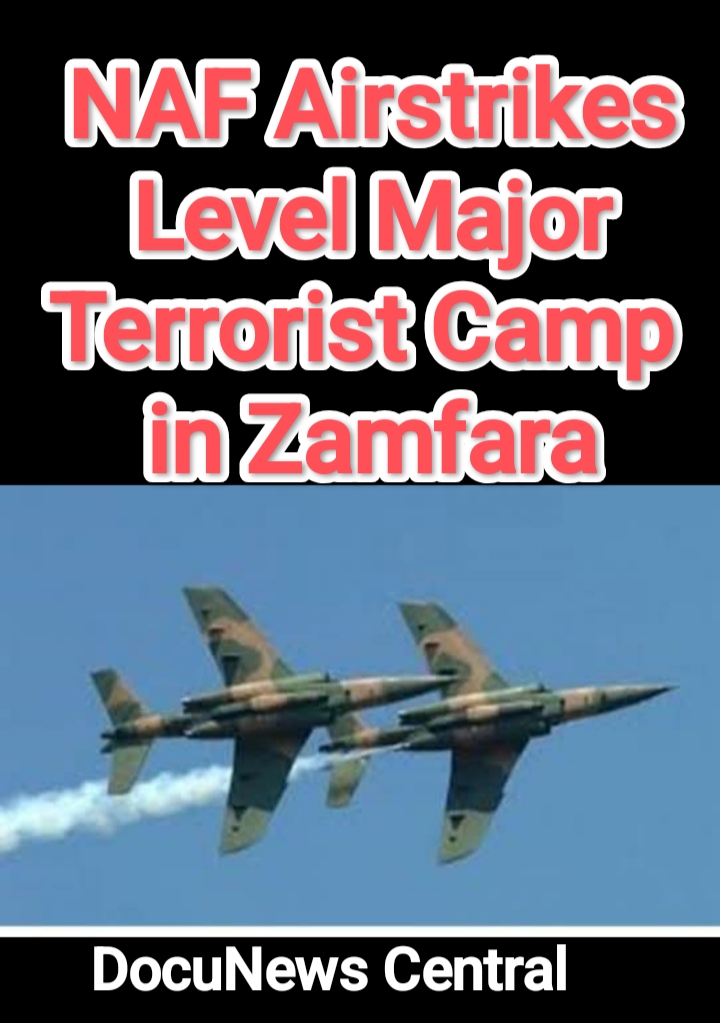


DocuNews Central
Introduction
Zamfara has witnessed intense security operations in recent years. Terror groups continue to build hidden bases across the state’s forests. These camps serve as hubs for logistics, weapon storage, and kidnapping activities. However, the Nigerian Air Force (NAF) has intensified its fight against criminal gangs. The latest operation delivered a major blow as airstrikes destroyed a major terrorist camp deep inside Zamfara.
The mission restored hope to residents who have endured constant attacks. It also proved the military’s commitment to restoring peace across the Northwest. For more background on ongoing security matters, visit our Security Watch section.
How the Operation Started
Security intelligence triggered the operation. Surveillance teams tracked suspicious movements in the area. Informants then supplied fresh details about a growing camp hidden in the forest. After several assessments, the NAF confirmed the presence of tents, rustled cattle, motorcycles, ammunition, and several terrorist leaders.
Once verified, the Air Component of Operation Hadarin Daji prepared a fast and strategic strike plan. This approach aligns with earlier precision missions documented in NAF Operations.
Precision Strikes on High-Value Targets
When the aircraft arrived, pilots spotted clusters of structures. Terrorists moved around the camp and attempted to escape. Yet the NAF launched a coordinated attack. Several bombs hit marked locations with precision. The explosions destroyed key shelters and neutralized many criminals.
Some terrorists fled into the forest, abandoning their weapons. Troops on the ground advanced and secured the entire area. This success confirmed the Air Force now uses improved surveillance tools. It also showed strong coordination with ground forces, something we discussed earlier in Defence Analysis.
Impact on Terrorist Networks
This operation hit the criminal network hard. The destroyed camp served as a command base where terrorists planned raids. It also supported kidnapping routes. By removing such a base, the military disrupted their logistics and weakened their confidence.
The attack created relief for residents, especially farmers. Many had abandoned farmlands because of persistent raids. Now they expect fewer attacks along major farming routes. For deeper insight into terror structures, check our Crime Insights section.
Residents React to the Operation
After the strike, residents expressed deep gratitude. Many had lived in fear for years. Criminals attacked villages without warning. Some families fled their homes. Others lost harvests after abandoning their farms.
The recent strikes renewed their confidence. Local leaders praised the operation and urged the military to maintain pressure. You can explore similar community reactions at Community Response.
Why Zamfara Has Become a Hotspot
Zamfara’s forests stretch across many local government areas. The difficult terrain allows terrorists to hide easily. They target mining sites, highways, and isolated farms. Over time, they expanded their networks, turning Zamfara into a major hotspot.
The government is now working to reverse this trend. The NAF strike forms part of this long-term strategy, which appears in Government Security Policies.
The Role of Air Power in Today’s Fight Against Terror
Air power gives the military a significant advantage. Pilots can target deep forest locations without exposing ground troops. Meanwhile, drones and reconnaissance aircraft provide real-time images that guide precise strikes.
With constant surveillance, terrorists can no longer gather freely. More insights into Nigeria’s air capabilities appear in Military Airpower Reports.
Ground Troops Move In After the Strike
After the bombs hit the camp, ground soldiers advanced to secure the area. They discovered burnt motorcycles, destroyed rifles, and food stores. Patrol teams extended the search to prevent regrouping attempts.
The army also shared intelligence gathered from the scene. That data will guide future missions. Details about similar operations are available in Joint Task Force Updates.
Why This Operation Matters Now
The timing was crucial. Terrorists had increased assaults on highways and villages in recent weeks. This strike sent a strong message. Terrorists now realize the military monitors their movements closely.
The operation also boosts the morale of communities and security personnel. You may explore previous success stories at Success Stories.
Federal Government’s Response
The Federal Government welcomed the strike. Officials restated their commitment to restoring peace. They also encouraged residents to share reliable information with security agencies, as community involvement remains vital.
Government reactions to similar operations appear in FG Security Briefings.
International Observers Take Note
Security analysts outside Nigeria have been monitoring the recent developments. Many believe that decisive airstrikes weaken terrorist networks faster than ground-only operations. They also commend Nigeria’s use of modern reconnaissance tools.
Comparative reports on global anti-terror strategies appear in Global Security Analysis.
Challenges Still Ahead
Although the operation succeeded, challenges remain. Terror networks operate in clusters. Destroying one camp does not end their activities. The wide forests allow them to relocate easily.
That is why continuous surveillance and strikes remain important. More details about these challenges appear in Security Challenges.
The Importance of Sustained Pressure
Security experts emphasize constant pressure. Terror groups weaken when they face nonstop attacks. If the military relaxes, criminals gain strength again.
This topic appears in our long-form analysis at Counter Terrorism Strategy.
What Residents Should Expect Next
Residents should expect more patrols. Helicopters will continue scanning forests. Troops will comb remote areas to stop new camps from emerging.
Communities should report suspicious movements. Many successful missions begin with community intelligence. Learn more at Community Security Guide.
Conclusion
The successful NAF airstrikes in Zamfara mark a major victory in the ongoing fight against terrorism. The destruction of the camp weakens criminal networks and restores hope to residents. The operation also highlights Nigeria’s improved air capabilities.
More developments will follow as the military intensifies operations. Stay updated with full coverage here at DocuNews Central.






